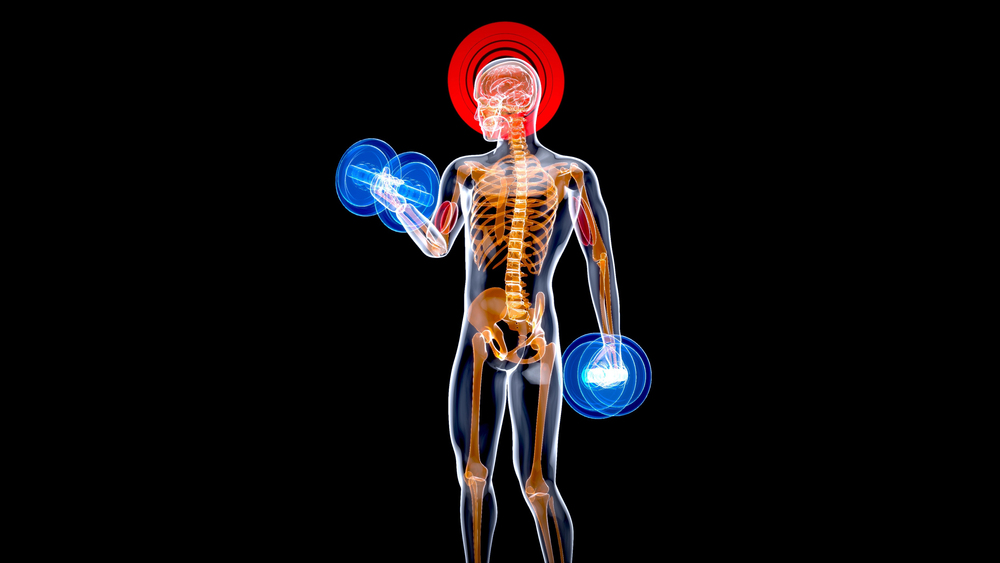Why You Need Protein for Gaining Muscle and Bulking
In order you gain muscle, you need to eat enough protein. Protein is needed for muscle protein synthesis, which is the process your muscles undertake to heal and grow. Basically, when you resistance train, you cause microtears in your muscle fibers. Amino acids, the crucial building blocks for protein, are essential for facilitating muscle protein synthesis. Therefore, increasing the amount of protein in your diet is nearly as important as exercise for increasing your muscle mass.
How Much Protein Should You Eat for Muscle Growth?
We’ve established that protein is an important component to gaining muscle, but how much? The commonly advised “recommended dietary allowance” is 0.8 grams of protein per kilogram(kg) of body weight a day/0.36 grams of protein per pound of body weight a day[1]. That is only about 61 grams of protein per day for a 170-pound person. It is important to note that this well-known recommendation was created for sedentary adults who exercise minimally, and it is the minimum.
The bare minimum is not the optimal number anyone into fitness should be going by. Above that, there is a lack of standards for protein consumption[2]. However, based on the evidence available, we have some good suggestions. If you regularly perform resistance exercise and you’re looking to gain muscle, most evidence suggests consuming around 1.6 grams of protein per kg of body weight/0.73 grams of protein per pound of body weight a day at minimum. This is over double the daily recommended value that’s given out as a baseline minimum for sedentary adults.
Is There Such a Thing as Too Much Protein?
In short, there is indeed such a thing as too much protein. Most experts suggest staying at or below 2 grams of protein per kg/0.9 grams per pound of body weight for healthy digestion[1]. Some people insist on eating even more than that for a bulk, so it’s important to know the healthy limit. The tolerable upper limit for protein is around 3.5kg of protein per kg of body weight/1.58 grams of protein per pound[2]. Therefore, the absolute highest amount of protein an 170-pound person should eat in a day is about 268.6 grams.
There is evidence that eating excess protein can increase risk for metabolic and bone issues[3]. However, it is difficult to eat above this threshold, so the average person shouldn’t need to worry about this. Additionally, the general consensus of research is that protein consumption is necessary and good for your health; it’s just that too much of a good thing can be bad. Eating close to the upper limit (1.58 grams of protein per pound) may be suitable for temporary muscle gain, primarily for short-term bulking. On the other hand, eating between 0.73-0.9 grams of protein per pound of body weight per day is more suitable for sustainable, long-term muscle gain.
How to Eat More Protein in a Day?
There are many tips to eat more protein in a day, but it all comes down to the individual. The top 3 tips I could give are to eat at least one high-protein food with every meal, invest in a good protein powder to supplement your protein intake, and to prepare meals. Eating protein dense foods like meat and eggs, or identifying good substitutes for meats with all essential amino acids, is crucial. Next, supplementing with powders or protein bars can help to fill in the gaps. Lastly, meal-prepping can help increase protein intake because you are aware of and can control how much protein you’re putting in your body. While we’re at it, check out our short and simple bulking shopping list.
Conclusion
-
- The bare minimum amount of protein you should eat in a day is 0.8 grams of protein per kilogram(kg) of body weight/0.36 grams of protein per pound of body weight a day
- You should eat no more than 1.58 grams of protein per pound of body weight per day
- The recommended amount of protein you should eat to gain muscle is 0.73-0.9 grams of protein per pound of body weight
- The final verdict: eat 0.73-0.9 grams of protein per pound of body weight each day while resistance training to build muscle
References
[1] Wu G. (2016). Dietary protein intake and human health. Food & function, 7(3), 1251–1265. https://doi.org/10.1039/c5fo01530h
[2] Cuenca-Sánchez M, Navas-Carrillo D, Orenes-Piñero E. Controversies surrounding high-protein diet intake: satiating effect and kidney and bone health. Adv Nutr. 2015 May 15;6(3):260-6. doi: 10.3945/an.114.007716. PMID: 25979491; PMCID: PMC4424780.
[3] Kerstetter J., O’Brien K., & Insogna K. (2003) Dietary protein, calcium metabolism, and skeletal homeostasis revisited. Am J Clin Nutr. 2003 Sep;78(3 Suppl):584S-592S. doi: 10.1093/ajcn/78.3.584S. PMID: 12936953.
StrengthfromScratch is operated by NASM-certified personal trainers, not doctors. Please consult with your dietitian or provider before making any changes to your diet. This is not intended as medical advice and is for informative purposes only.

